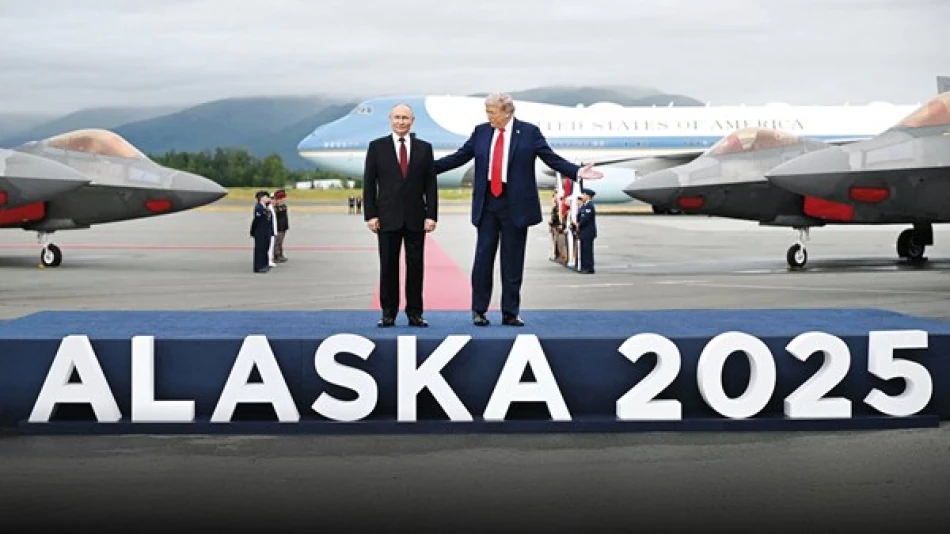
Trump and Putin Set to Engage in Historic Alaska Summit
Trump-Putin Alaska Summit Signals Major Shift in Ukraine War Diplomacy
President Donald Trump and Vladimir Putin held a historic summit in Alaska, marking a pivotal moment that could reshape the Ukraine conflict and US-Russia relations. The meeting, which lasted several hours at Elmendorf-Richardson Joint Base, represents a significant departure from multilateral European frameworks toward direct superpower negotiations, potentially accelerating efforts to end the war while raising questions about Ukraine's role in determining its own fate.
A Carefully Choreographed Display of Diplomacy
The Alaska venue carried deep symbolic weight, chosen for its geographic and historical significance as neutral ground between the two nuclear powers. Trump's presidential aircraft arrived first, with the president waiting aboard until Putin's plane landed—a diplomatic courtesy that underscored the meeting's importance.
The leaders exchanged warm handshakes on a specially constructed platform adorned with "Alaska 2025" banners, surrounded by parked fighter jets and red carpet. B-2 and F-22 aircraft flew overhead in ceremonial tribute, creating a spectacle designed to project both military strength and diplomatic openness.
Format Changes Signal Serious Intent
Originally planned as a one-on-one meeting, the summit expanded to include senior advisors from both sides. White House spokesperson Caroline Levitt confirmed that Secretary of State Marco Rubio and Special Envoy Steve Witkoff joined Trump, while Russian Foreign Minister Sergey Lavrov and aide Yuri Ushakov accompanied Putin. CNN characterized this format change as "highly significant," suggesting both leaders wanted witnesses to any agreements reached.
Trump's Measured Approach to Ukraine Negotiations
Speaking from Air Force One en route to Alaska, Trump carefully positioned himself as a facilitator rather than negotiator. "I'm not here to negotiate on behalf of Ukraine, I'm here to try to get them to the table," he stated, indicating plans for a trilateral summit including Ukrainian President Volodymyr Zelensky and potentially European leaders.
When pressed about territorial concessions, Trump deflected responsibility to Ukraine while maintaining leverage: "That will be discussed, but I have to let Ukraine make that decision, and I think they'll make the right decision." This approach allows Trump to claim credit for peace efforts while avoiding blame for any unpopular compromises.
Addressing Continued Russian Strikes
Trump interpreted Russia's ongoing attacks during the summit buildup as negotiating tactics rather than bad faith. "I think they're trying to negotiate. He's trying to set up conditions for what he thinks is a better deal. Actually, it hurts him, and I'll talk to him about that," Trump said, suggesting confidence in his ability to influence Putin's military strategy.
Russian Expectations and Incentive Structures
Kremlin spokesman Dmitry Peskov anticipated a 6-7 hour summit duration, expressing optimism about achieving results that could lead to the trilateral meeting with Zelensky. Russian Foreign Minister Lavrov confidently predicted that "some sanctions will definitely be lifted," indicating Moscow's clear expectations for tangible benefits.
US officials told CNN that America recognizes the need to offer Putin incentives to advance Ukrainian peace efforts. These could include new trade deals or strategic arms agreements—a significant departure from the Biden administration's sanctions-heavy approach.
Market and Strategic Implications
The summit's outcomes could dramatically impact global energy markets, defense spending, and geopolitical risk assessments. Any sanctions relief would likely boost Russian energy exports and potentially lower European energy costs, while reduced military aid to Ukraine could affect defense contractor revenues and NATO spending priorities.
For investors, the meeting signals potential volatility in commodities markets, particularly oil and gas, as well as currencies in affected regions. The prospect of renewed US-Russia trade relationships could create opportunities in sectors previously constrained by sanctions.
Expert Analysis: Beyond Ukraine
Political analysts emphasize that the Alaska summit transcends the Ukraine conflict, potentially reshaping broader US-Russia relations. American political analyst Irina Tsukerman noted that the meeting could "open a new page" in bilateral relations, affecting multiple global issues beyond Eastern Europe.
George Washington University political science professor Nabil Mikhail predicted the summit would produce "noticeable de-escalation" and possibly a temporary ceasefire, giving all parties space to reassess their positions. However, he warned that Trump faces potential opposition from "hawks" in both parties if perceived as too accommodating to Moscow.
Domestic Political Challenges
American analyst Raluca Nita observed that while Ukraine likely won't accept territorial concessions, Putin will use the summit platform to demonstrate his willingness to engage diplomatically. She noted Trump's dual motivation: achieving a domestic political victory by ending the conflict while potentially justifying reduced military aid to Ukraine.
This dynamic creates a complex political calculus where Trump must balance his promise to end the war quickly against criticism that he's abandoning a democratic ally. The Alaska summit's outcomes will likely determine whether Trump can navigate this challenge successfully or face sustained opposition from foreign policy establishments in both parties.
Historical Precedent and Future Implications
The Alaska summit recalls Cold War-era superpower diplomacy, when US and Soviet leaders met to manage global tensions through direct dialogue. Unlike previous Trump-Putin meetings in Helsinki or Hamburg, the Alaska venue and expanded format suggest both leaders learned from past criticism about secretive negotiations.
The meeting's success or failure will likely influence Trump's broader foreign policy approach and America's role in European security architecture. A breakthrough could validate Trump's unconventional diplomatic methods, while failure might strengthen arguments for traditional multilateral approaches to international crises.
Most Viewed News

 Layla Al Mansoori
Layla Al Mansoori






